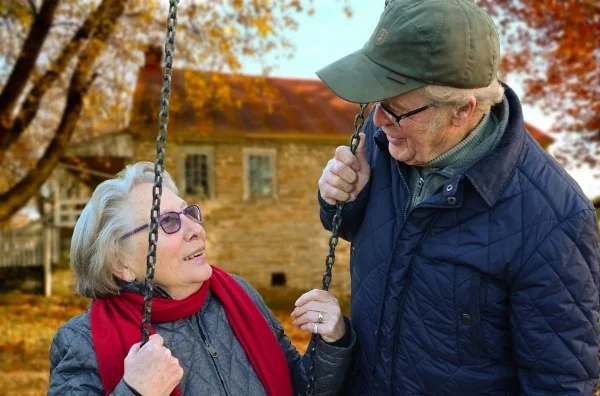We’ve already talked about how to know it’s time for a friend break-up, but how do you know that someone would make a good friend? Here are four “green flags” that suggest you might want to keep someone in your life.
Read MoreWe’ve gotten a lot of requests for this one.
They often sound something like: “I’m a good communicator, but it’s just that my coworker/ roommate/ mom/ boyfriend’s second cousin is awful at communication.”
But no matter how horrible of a communicator they are, you can use this trick to work within their limited communication skills and get your point across.
Okay, we’ll run with the title and make this quick. When someone new is entering your life, whether it’s a friend, a coworker, a romantic interest, or someone else you’re still figuring out how and to what extent you’d like to fit them into your life, try asking yourself:
Read MoreImagine you’re in an animated conversation with someone. You both laugh at something together, but then your chuckles trail off and you’re left in silence. What now?
Do you say something immediately? Do you wait for the other person to say something, no matter how long that takes? Do you jump in with whatever enters your head? Of course, it likely differs from situation to situation, but you probably average some number of seconds before you say something new if the other person doesn’t say anything, and you probably don’t stray too far from that average too often.
Whether you’re looking for a good fit with a friend, a romantic partner, or even a new workplace, you’ve probably heard tips like “communication is key” and “stick with someone/somewhere that encourages you to grow” and “go with your gut.” Sometimes even those clichés can be useful, but there are some other “tells” about how any given relationship is going that can be easy to miss if you’re not looking for them, especially since they aren’t as culturally emphasized as platitudes like “follow your heart.” Of course, these aren’t going to be the *only* things you should pay attention to, but they can all be easy to overlook, particularly if you are focusing some portion of your energy on appearing desirable to the other person/ workplace/ whatever.
Five to one: According to one of the most prominent social scientists in the field of romantic relationships, John Gottman, that’s the ratio of positive to negative interactions in stable relationships. Couples were significantly less likely to get a divorce when they had about five positive interactions for every negative interaction they had.
Read MoreWhat do the following have in common?
- A “define the relationship” conversation with a crush
- Mentioning to your roommate that you never check your Facebook messages
- Telling your friend that the way he acts when he’s angry is scary to you
Have you ever felt comfortable telling something intimate to your hair stylist or bartender or ride-share driver, and then finding yourself feeling warm toward them, and perhaps inclined to tip more? Have you ever developed strong feelings for someone you were dating in a low-stakes context, like someone you knew you didn’t want to be with long-term? Then you are likely familiar with what I’ve deemed “the vulnerability paradox.” According to the vulnerability paradox, a pattern I’ve noticed in myself and others, it’s often easier to open up to those we are not relatively close to, yet, the very act of opening up brings us closer.
Read MoreCultural niceties can make it challenging to answer “How are you?” honestly if you are feeling much more than, “Fine, thanks. How about you?” If you change up the phrasing of your question even slightly, though, it can often be enough to disrupt the automatic process that leads to uninformative and uninteresting answers. Here are some options for making it easier on others to answer you honestly, even if they’re not feeling “fine.”
Read MoreWe'll cut to the chase. It’s boundaries, or more specifically, setting boundaries liberally and respecting them consistently.
Surprised? Think about it this way. Boundaries come on a spectrum, which looks different for each person-- there are smaller boundaries, which might look like, “Please lower your voice; my roommates are sleeping” and bigger boundaries, which might be more like, “Please don’t come to my house again.”
What a lot of folks don’t realize is that setting and respecting smaller boundaries are the single best way to avoid the big boundaries.
I’ve always been a “friend-group therapist.” Even as my social network has morphed over time, the one constant is that for better or for worse, people seem to come to me for help with their struggles more often than they go to others. It’s been that way ever since I was in grade school, when my crush looked to me for advice about whether or not he should tell HIS crush that he was really into her (ouch).
Read MoreImagine you’re hanging out with a friend.
You’ve been chatting for a bit, and they reveal something more vulnerable about themselves than they usually discuss with you. Maybe it’s admitting that they feel lonely at work, or maybe it’s talking about their history with depression. Whatever it is, it’s a level or two deeper than your usual conversations.
How do you respond?
Read MoreI recently found myself in two almost identical social situations with one small difference that changed everything about the way the interaction went down.
A few months ago, I had some new friends over my house when one of my friends took advantage of a brief silence:
“Can I ask you all a weird question?”
We all nodded and leaned forward a tiny bit in our chairs.
“Is a hamburger a sandwich?”
Read More












